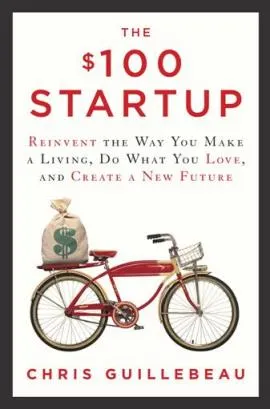[Book Review] The $100 Startup: Reinvent the Way You Make a Living, Do What You Love, and Create a New Future

2012 Crown Business (Amazon)
14 chapters; 285 pages
As compared to the dozens of books addressing corporate innovation or technology startups or small/medium businesses, The $100 Startup has a refreshingly different focus: the ‘solopreneur’ or individual entrepreneurs who strike off on their own or with small teams, and convert ‘passions into profits’ through micro-businesses.
Chris Guillebeau is an entrepreneur, author, blogger and speaker championing the cause of entrepreneurship. He is based in Oregon (at least part of the time!) and has spoken right here in Bangalore as well. He maintains an active site at ChrisGuillebeau.com and his book also has a companion site with online resources.
“Microbusinesses aren’t new; they’ve been around since the beginning of commerce. What’s changed, however, is the ability to test, launch and scale your project quickly and on the cheap,” explains Chris.
The book spells out how to turn small ideas into income, and help people find more satisfaction and meaning in their work and hobbies. The author says this is not a book about business, but pursuit of freedom along with independence and wealth. The writing style is straightforward, and packed with lots of useful tables, sidebars and checklists (eg. for developing an offer, steps for an initial launch, approaches for giveaways, up-selling/cross-selling/post-selling, partnerships/outsourcing).
Many of the profiles in the book are of ‘accidental entrepreneurs’ – those who lost their job with a big company and stumbled onto the path of entrepreneurship and self-employment out of necessity. Many had no special technology or business skills, but a hobby or activity they were particularly passionate about.
The author recommends three steps for aspiring solopreneurs:
1. Convergence: find out if some part of your passion has value which people may be willing to pay for
2. Skill transformation: refine your skills so you can convert your activities into products and services which people care about
3. Revenues: Find out ways to get paid from new and repeat customers in different markets.
Thanks to the Internet, access to media for research, test-marketing and promotion have come down dramatically, creating new opportunities for solopreneurs around the world. A new generation of cloud-based services also allows work to be stored online and conduct rapid small surveys; and Paypal facilitates online payment worldwide for individuals.
Good ideas for solopreneurs can come from observing inefficiencies in the marketplace, new technologies, changes in the economy, deeper trends underneath market fads, and spinoffs of related ideas. To effectively market these ideas, entrepreneurs should focus not just on features or descriptions of their offerings, but the larger benefits and emotional impacts, eg. not just data tools but better visualisation to solve business problems, in the case of spreadsheet fixes.
The book highlights dozens of individuals who started off businesses with around $100 of their own investment, and now earn $50,000 or more. The key is to discover aspects of one’s personal passions that can be monetised, and restructure lifestyles to give greater freedom and fulfillment. Entrepreneurs need to be good not just in their areas of work but also in finding out what other people will pay for it.
Entrepreneurship can happen without venture capital, funding rounds, an MBA or a strong technology background, Chris argues. Starting small and independently also reduces risk of big failure, and more and more people are realising this now and striking out on their own. “Freedom is what you are looking for. Value is how to achieve it,” says Chris.
Some of the featured entrepreneurs leverage the global and interactive reach of the Internet. A snowboarding instructor in Canada created a DVD set of instructional videos, which has now grown to a $300,000 a year business. A travel entrepreneur earns more than $100,000 a year helping people use their Frequent Flyer miles effectively. A Croatian entrepreneur has crafted a six-figure business helping corporate employees around the world manage data better. An expert in notekeeping software Evernotes published a manual/e-book called Evernote Essentials, and is targeting annual revenue of more than $120,000 all for himself.
A Microsoft Excel expert in India offers spreadsheet templates and advice to online users around the world. A piano teacher who wrote software for managing his students and classes converted the software itself into a business. A publisher runs ProBlogger.com and CopyBlogger.com to teach professionals how to use social media. Other online solopreneurs offer services in digital photography, social media marketing, Web design, and writing services.
Other entrepreneurs are more traditional, like yarn shops, coffee outlets, handmade toys, travel coupon books, clothing design, tourism, customised yoga classes, furniture and wine.
The book raises a number of interesting questions. Should you convert your hobby into your work, or keep them separate? Will the hobby still seem as attractive if it becomes a fulltime activity? Will the day-to-day routine activities of running the hobby as a business make you lose your passion? Is it possible to be a fulltime employee at a big company and also a solopreneur on the side? Do you like mixing work with vacations and travel?
Chris shows that may solopreneurs are quite happy running niche businesses and do not want to scale up their companies to become national or global leaders. In fact, for some of them hiring employees can take away from the flexibility and adaptability of their micro-businesses, especially during tough patches.
Entrepreneurs will need to be flexible and pivot with changes or outcomes, such as targeting business customers instead of individual consumers as a market segment, or dealing with contract uncertainties in the case of international clients.
Entrepreneurs who have already read other books about startups, or who have already searched online for business resources, may not get much out of this book; it is addressed more at fence-sitters who may not be active readers of business strategy.
In sum, this is a pragmatic and motivational book for those aspiring entrepreneurs who need a bit of reassurance and supportive material to make the jump into launching their own businesses. This is a thought-provoking read not just for young adults but also mid-career professionals who now have the ideas to launch their own businesses.
“Sometimes the best advice is none at all. If you know what you need to do, the next step is simply to do it. Stop waiting. Start taking action,” the author concludes.
The book is filled with good quotes, it would be apt to end this review with some of them:
“An ounce of action is worth a ton of theory.” – Friedrich Engels
“If passion drives you, let reason hold the reins.” – Benjamin Franklin
“Artists are serial entrepreneurs.” – Gabriella Redding
“Good things happen to those who hustle.” – Anais Nin
“I’m not a businessman. I’m a business, man!” -- Jay-Z
[Follow YourStory's research director Madanmohan Rao on Twitter at http://twitter.com/MadanRao ]


![[Book Review] The $100 Startup: Reinvent the Way You Make a Living, Do What You Love, and Create a New Future](https://images.yourstory.com/cs/wordpress/2012/12/100startup.jpeg?mode=crop&crop=faces&ar=16%3A9&format=auto&w=1920&q=75)




